Navigating the complex world of the J-1 visa, particularly the foreign residence requirement, is no easy feat. But fear not, we’ve got you covered. In this comprehensive guide, we’ll explore the ins and outs of the J-1 visa waiver process that allows eligible foreign nationals to stay in the United States beyond their exchange visitor program. Are you ready to dive in?
Short Summary
- Exchange visitor (J) visas are nonimmigrant visas for individuals approved to participate in exchange visitor programs in the United States. Some J-1 exchange visitors are subject to the two-year foreign residence requirement, also known as the “home country rule” or the “home residency requirement,” which is part of U.S. law, in the Immigration and Nationality Act, Section 212(e), also referred to as INA § 212(e).
- The four waiver bases are the Interested Government Agency (IGA) Request (of which there are several varieties), the No Objection (NO) Statement, the I-612 Persecution Waiver, and the I-612 Exceptional Hardship Waiver.
- In all cases, applicants have the burden of proving eligibility for a waiver of the J-1 foreign residence requirement and must demonstrate by a preponderance of the evidence that they are fully qualified for the waiver.
J1 Visa Waiver Basics
J-1 exchange visitors subject to the two-year foreign residence requirement of INA § 212(e) are subject to several legal disabilities until they obtain a waiver or fulfill the requirement. These legal disabilities prevent them from applying for H or L visa stamps, permanent resident status, an immigrant visa, and change of status (except A or G for non-physicians, see INA § 248(a)).
INA § 212(e) lists three ways one can become subject to the two-year foreign residence requirement: U.S. or foreign government funding; training in an area on the home country’s Skills List; or participation in graduate medical education. Sometimes it can be difficult to determine if a J-1 visa holder is subject to the two-year foreign residence requirement of INA § 212(e). Annotations on J visa stamps and DS-2019s (formerly IAP-66s) are frequently incorrect and are not legally binding.
If unclear, a J-1 visa holder can request an advisory opinion from the U.S. Department of State Waiver Review Division (DOS-WRD), which typically errs on the side of finding people subject even when the individual is not. Both USCIS and DOS-WRD assert they are the final arbiters of whether one is subject.
This requirement is part of U.S. law under the Immigration and Nationality Act, Section 212(e) or INA 212(e). The Department of Homeland Security (DHS) must approve the waiver before the applicant can apply for a change of status in the United States through U.S. Citizenship and Immigration Services (USCIS).
Government Funding
Exchange visitors are subject if their participation in the program was financed in whole or in part, directly or indirectly, by an agency of the government of the United States or by the government of the country of their nationality or last residence.
Government financing that does not go directly to the exchange visitor should not subject the exchange visitor to the two-year foreign residence requirement. That said, the State Department Waiver Review Division (WRD) tends to err on the side of finding people subject in this circumstance. Fulbright funding is the most common form of funding seen in J-1 practice.
This kind of case is especially difficult to win. Note that foreign government funding does not necessarily create the same kind of special problems that are associated with U.S. government funding.
Skills List
An exchange visitor is subject to the two-year foreign residence requirement if he/she, at the time of obtaining exchange visitor status, was a national or resident of a country that had designated the his/her field of specialized knowledge of skill as clearly required by the country.
Current skills lists and previous skills lists can be found on the U.S. Department of State’s website. The easiest and most common way to obtain a waiver for one subject based on the skills list is through a No Objection (NO) waiver application.
Graduate Medical Training
Exchange visitors who come to the United States to receive graduate medical education or training are subject. These individuals must be sponsored by the Educational Commission for Foreign Medical Graduates (ECFMG).
J1 Visa Waiver Eligibility Criteria
J-1 waiver applications can be a daunting task, especially when it comes to determining your eligibility for a specific type of waiver and understanding what it takes to file a successful INA 212(e) waiver application. Given the complexity of J-1 visa waiver law, it’s crucial for former and current J-1 visa holders subject to the J-1 foreign residence requirement and their families to be well-informed about eligibility requirements and waiver processes to avoid any unexpected complications and disappointments.
Eligibility for a J-1 visa waiver varies by basis, making it essential for applicants to familiarize themselves with the specific requirements of each, since not all options are available to all applicants. Each of the four possible bases for recommendation of a waiver are unique, and each has its own set of regulations and requirements. So being well-informed and choosing the correct basis is key to a successful waiver application.
Our firm primarily handles I-612 exceptional hardship and persecution waiver applications for clients we believe can meet the burden of proving eligibility. We also do No Objection and IGA waiver applications

Understanding the I-612 Waiver
The majority of our applications are I-612 persecution and exceptional hardship waivers done for eligible current or former J-1 visa holders who are concerned their return to their home countries would expose them to persecution risks on account of race, religion, or political opinion or believe their absence for two years or moving their families to the home country would cause their U.S. qualifying relatives, including lawful permanent resident spouse, exceptional hardship.
Only applicants requesting a waiver on the basis of exceptional hardship or persecution are required to file a Form I-612 Application for Waiver of the Foreign Residence Requirement (under Section 212(e) of the Immigration and Nationality Act, as Amended). But the process involves more than just filling out and filing a form. Whether pursuing an exceptional hardship waiver or persecution waiver, adequate and substantiative evidence must be provided in support of each application. We are often called upon to resubmit applications for clients after their first attempts fail, mostly due to inadequate evidence.
Applications are adjudicated at the UCSIC California Service Center. If USCIS determines the applicant has met his or her burden of proof, the information will be forward to the U.S. Department of State Waiver Review Division (DOS-WRD) for a recommendation based on the program, policy, and foreign relations aspects of the case. DOS-WRD then transmits the recommendation to USCIS, which reviews and issues the decision to the applicant and, if applicable, the applicant’s attorney.
If USCIS denies the waiver application before a referral to the DOS, the applicant may appeal the decision to the USCIS Administrative Appeals Office (AAO). If a waiver is denied due to a negative DOS recommendation, the denial cannot be appealed, but it may be possible for the applicant to reapply for a waiver on a different basis.

Tips for a Successful I-612 Waiver Application
Filing a wavier application involves more than just filling out a form; it requires submitting all the specific evidence required for a specific waiver basis. The exact documentation required for a Form I-612 waiver varies depending on the applicant’s situation and the precise grounds for seeking a J-1 waiver.
For example, those applying for a waiver based on exceptional hardship typically need to submit medical records and other supporting documents that illustrate the hardship that would result from the applicant’s departure from the United States or relocating their family to the home country. Those applying for a waiver based on persecution need to submit documentation that illustrates the applicant has a reasonable fear of suffering persecution in the home country.
The Form I-612 waiver application filing fee is $930, which covers the cost of processing the waiver application and must be submitted along with the form and supporting documents. It’s important to note that the fee is non-refundable, so applicants should ensure that they thoroughly understand the eligibility criteria and provide all necessary supporting documentation before submitting their applications. By ensuring the form is accurately completed and all required and supporting evidence is submitted, applicants can avoid delays in the processing of their waiver application.
Form DS-3035 Application for Recommendation of a J-1 Waiver of the two-year foreign residence requirement is also filed at the same time with DOS. The filing fee for this form is $120 and is also nonrefundable.
Applicants can monitor the status of their applications through the USCIS Case Status Online website using their I-612 receipt number and the DOS using the WRD (Waiver Review Division) number assigned to their application or “case.” This can provide valuable peace of mind and ensure applicants stay informed about the status of their waiver applications throughout the process.
Legal Assistance and Support
The J-1 visa waiver process can be challenging, but with the right legal assistance and support, applicants can greatly increase their chances of success. We offer comprehensive consultations to explore the waiver basis most suitable for each applicant. Our extensive experience in I-612, NO, and IGA waivers ensures that J-1 waiver applicants receive the best possible legal support throughout the entire process.
We work with clients we believe have viable eligibility grounds for a waiver. This is determined through email introductions and scheduled consultations, which cost $200 and can be done via phone or Zoom. If you choose to work with us, we’ll guide you through collecting and presenting the best possible evidence you need to maximize your chance of success. We will also communicate with immigration authorities and mitigate challenges on your behalf. By working closely with us and following our guidance, you can increase your chances of submitting a successful waiver application.
Frequently Asked Questions
Who is eligible for a J-1 waiver?
Eligibility for a J-1 visa waiver varies by basis, making it essential for applicants to familiarize themselves with the specific requirements of each, since not all options are available to all applicants. Each of the four possible bases for recommendation of a waiver are unique, and each has its own set of regulations and requirements. So being well-informed and choosing the correct basis is key to a successful waiver application.
What is the meaning of J-1 visa waiver?
J-1 exchange visitors subject to the two-year foreign residence requirement of INA § 212(e) are subject to several legal disabilities until they obtain a waiver or fulfill the requirement. These legal disabilities prevent them from applying for H or L visa stamps, permanent resident status, an immigrant visa, and change of status (except A or G for non-physicians, see INA § 248(a)). An INA 212(e) waiver allows eligible former and current J-1 exchange visitors to overcome these legal disabilities.
Who needs to file Form I-612?
Applicants requesting J-1 visa waivers of the two-year foreign residence requirement on the basis of exceptional hardship or persecution are required to file Form I-612 Application for Waiver of the Foreign Residence Requirement under Section 212(e) of the Immigration and Nationality Act, as Amended.
How long does it take to get a J-1 visa waiver?
Waiver application processing times vary depending on multiple factors. We are currently seeing processing times for I-612 waivers of 6-8 months to 12-18 months. With such long processing times, it’s essential that applicants plan accordingly and be prepared for potential delays.
What are alternatives to J-1 waivers?
There are alternatives to a J-1 waiver: fulfillment with substantial fulfillment a positive equity in future waiver applications; and asylum, which doesn’t waive the J-1 foreign residence requirement but permits adjustment of status under the asylum provision of INA.
